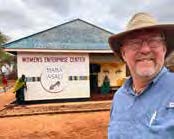Investing in Nature Brings Me Hope
by Tim L. Tetzlaff, Director of Conservation,
Naples Zoo at Caribbean Gardens
I first saw Naples in 1969 when my family moved into The Moorings. We walked through patches of sandspurs
to the beach and played in the fields and trees that covered nearly a city block across the street from our house. Before I was a teenager, I was attending school with kids who lived in the apartments and condos built on those lands – just as the generation before me once played on the land where my house stood. And panthers and bears once denned on these lands before them.
 Conversion of wild habitat to agriculture to suburban and urban centers is a longstanding pattern as each of us needs resources to live. But with notable foresight, our local, state, and federal parks now protect 13% of the USA’s land. Indeed, this year marks the fiftieth anniversary of Big Cypress National Preserve, a noteworthy example of collaboration and compromise and I am honored to have a Zoo-Park Partnership with them. These protected lands are enriched by programs such as regulations on air and water pollution as well as conservation easements where privately-held land is set aside for future generations. Services from these healthy ecosystems are critical to our wellbeing and range from crop pollination and water purification to storm protection and soil retention to name but a few – all bringing tens of trillions of dollars of value to our global economy that are worth investing in.
Conversion of wild habitat to agriculture to suburban and urban centers is a longstanding pattern as each of us needs resources to live. But with notable foresight, our local, state, and federal parks now protect 13% of the USA’s land. Indeed, this year marks the fiftieth anniversary of Big Cypress National Preserve, a noteworthy example of collaboration and compromise and I am honored to have a Zoo-Park Partnership with them. These protected lands are enriched by programs such as regulations on air and water pollution as well as conservation easements where privately-held land is set aside for future generations. Services from these healthy ecosystems are critical to our wellbeing and range from crop pollination and water purification to storm protection and soil retention to name but a few – all bringing tens of trillions of dollars of value to our global economy that are worth investing in.
Such efforts for unprotected land are key for us here, but also even in places like Tanzania, which has about 40% of its land protected. This brings us to a fascinating law I encountered that protects beekeeper income. Tanzanian law regulates the cutting of trees and agriculture in areas where people have beehives, an activity typically done by women. Beekeeping provides critical cash income and elevates a woman’s status as a breadwinner. Building on this, African People & Wildlife (APW) created the Mama Asali Women’s Enterprise Center where honeycombs are processed to streamline getting products to market such as the honey and lip balm I enjoy. To foster even greater success, Naples Zoo funds the salaries of five of APW’s Queen Bees – community members who work with other women to increase the success of their beekeeping activities. We also fund APW’s Women’s Empowerment Officer to expand educational and entrepreneurial opportunities.
 This protective rule for beekeeping also benefits wildlife like lions and leopards by maintaining wilderness. And to promote coexistence, Naples Zoo funds the annual salaries of five of APW’s Warriors for Wildlife. These men and women collect and analyze real-time technical field data and monitor the presence of big cats and elephants so that community members can keep their livestock and crops safe. And when a human-wildlife conflict event occurs, Warriors work to help.
This protective rule for beekeeping also benefits wildlife like lions and leopards by maintaining wilderness. And to promote coexistence, Naples Zoo funds the annual salaries of five of APW’s Warriors for Wildlife. These men and women collect and analyze real-time technical field data and monitor the presence of big cats and elephants so that community members can keep their livestock and crops safe. And when a human-wildlife conflict event occurs, Warriors work to help.
These innovative programs near and far and those committed to ensuring our collective needs give me hope. While the neighborhood fields of my youth may just be a memory, the wild areas we depend on today don’t need to be.

April Lecture: Visit www.napleszoo.org/speakers to meet the co-founder and CEO of African People & Wildlife, Dr. Laly Lichtenfeld, at the inaugural lecture in the new Hamill Family Education Center.




Leave a Reply
Want to join the discussion?Feel free to contribute!